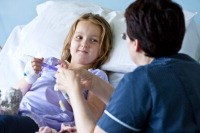International trial for treatment of relapsed neuroblastoma launches

The phase II study run by the Cancer Research UK Clinical Trials Unit in Birmingham has opened at The Royal Marsden NHS Foundation Trust and Leeds General Infirmary.
In total 120 patients across Europe, around 30 of whom will be treated at six different UK paediatric oncology centres. The study is a joint trial between Cancer Research UK, the Innovative Therapy for Children with Cancer (ITCC) and the International Society of Paediatric Oncology European Neuroblastoma Group (SIOPEN). Seven countries across Europe (UK, Austria, France, Germany, Italy, Netherlands, and Spain) will take part in the trial once they have regulatory approval.
Neuroblastoma is the most common childhood tumour occurring outside the brain. It develops from nerve cells left over from a baby's development in the womb and there are around 100 children diagnosed with the cancer each year in the UK. Despite the number of children surviving neuroblastoma rising from 17% in 1971 to 64% today, the aggressive form of the disease is still very hard to treat successfully.
Therapy for high risk neuroblastoma involves intensive chemotherapy, surgery, radiotherapy and immunotherapy which lasts more than a year. Despite this intense treatment, survival remains poor and over half of patients relapse. In this situation long term cure can be very difficult to achieve. This trial will determine the best chemotherapy regimen in patients with recurrent or resistant neuroblastoma. This regimen will then be used as a 'backbone' treatment, which can be combined with new drugs and therapies in future trials.
The trial will also investigate whether the drug bevacizumab (Avastin), can increase the effectiveness of the best backbone chemotherapy regimen.
Neuroblastoma tumour growth is very dependent on the creation of new blood vessels and children who have higher levels of tumour blood vessel growth tend to have the worst outcomes. This study will establish whether Bevacizumab, which inhibits blood vessel growth, can improve the effectiveness of the chemotherapy regimen.
Professor Andrew Pearson, Cancer Research UK professor of paediatric oncology at The Institute of Cancer Research, London and the Royal Marsden and lead researcher on the study, said: "There's an urgent need to develop new drugs which can be fast-tracked into frontline therapy. The goal is to develop treatment for each individual patient based on understanding the biology and genetics of neuroblastoma. This means we can target each tumour more precisely and abandon the 'one size fits all' approach.
"After a decade of "drought" of new studies for high risk neuroblastoma, there are now major advances and new drugs available to patients with three phase II studies and three to four phase I open in 2013 that can recruit patients with neuroblastoma. Crucially, the BEACON neuroblastoma trial will provide a framework in which these new drugs can be trialled and made available for patients."
Professor Pam Kearns, Director of the Cancer Research UK Clinical Trial's Unit in Birmingham, said: "We're proud to launch BEACON as our first ground-breaking international trial to help develop much needed new drugs for children with neuroblastoma. We hope it will lead to future trials that will ensure children with cancer get the best possible treatment."
Kate Law, Cancer Research UK's director of clinical research, said: "Cancer Research UK has been at the forefront of research into new treatments for childhood cancers. Although almost eight in 10 children with cancer now survive their disease, a figure that was as low as three in 10 in the 1960s, more work is needed to discover better treatments. The BEACON neuroblastoma trial is a vitally important step towards better and kinder treatments for children with neuroblastoma."
Source: Cancer Research UK


























